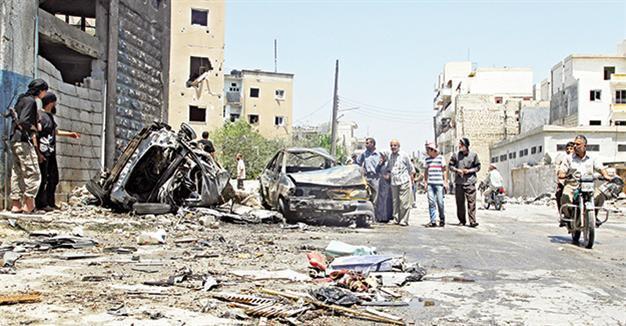US, Russia discuss Syria cooperation
WASHINGTON – Reuters

REUTERS photo
The Obama administration is considering a plan to coordinate air strikes on the al-Nusra Front and the Islamic State of Iraq and the Levant (ISIL) if Damascus stops bombing moderate rebels, U.S. officials said June 30 amid discussions with Russia.Washington backs the moderate rebels, who are under pressure from ISIL and government forces, but the plan depends in part on whether Russia is willing to press Syrian President Bashar al-Assad to stop bombing them.
Many U.S. officials and outside experts doubt Moscow is willing to do that.
It would also require moderate opposition forces to disentangle themselves from al-Nusra and move into identifiable areas where they would be vulnerable to government and Russian air attacks.
Although Russia says it has targeted ISIL, most of its strikes have been on the U.S.-backed moderate rebels, who distrust the al-Assad government, which they and Washington have accused of most of the cease-fire violations.
“If the moderates separate themselves from al-Nusra, immediately the Russians and al-Assad go kill them,” said Chris Harmer, an analyst with the Institute for the Study of War. “The idea that the moderate rebels will separate themselves from al-Nusra is just not going to happen. [The administration plan] is a Hail Mary pass that is dead on arrival. It’s staggering to me that anybody even at year five of this civil war thought this would be a good idea.”
The Washington Post, which first reported the plan, said the Obama administration had submitted a written proposal to Moscow, but two U.S. officials, speaking on condition of anonymity, said that while the plan is under discussion within the administration, no decisions have been made.
That Washington is even considering such a plan, however, reflects the unraveling of a Feb. 27 cessation of hostilities agreement that was supposed to bring some calm to a country riven by five years of civil war and promote a political settlement, as well as the weakness of the U.S.-backed moderate opposition forces.
In one sign of their predicament, U.S.-backed Syrian rebels on June 29 were pushed back from al-Bukamal, an ISIL-held town on the Iraq border, suffering casualties and seeing some of their fighters and arms captured, a rebel source said.
Finally, targeting the al-Nusra Front could end up boosting the popularity of the al-Qaeda affiliate, which is widely hailed by anti-government Syrians as the most effective fighting force seeking to oust al-Assad.
Prospects for a political deal to end the conflict appear dim, not least because there is no agreement on the future of al-Assad, whom the United States wants to step down, but whom Russia has supported with its military intervention since last September.
U.N. Syria envoy Staffan De Mistura is in Washington this week to meet senior U.S. officials to discuss efforts to reduce attacks on civilians and the provision of humanitarian aid as he “continues to work to advance a political transition,” National Security Council spokesman Carl Woog said June 30.
















